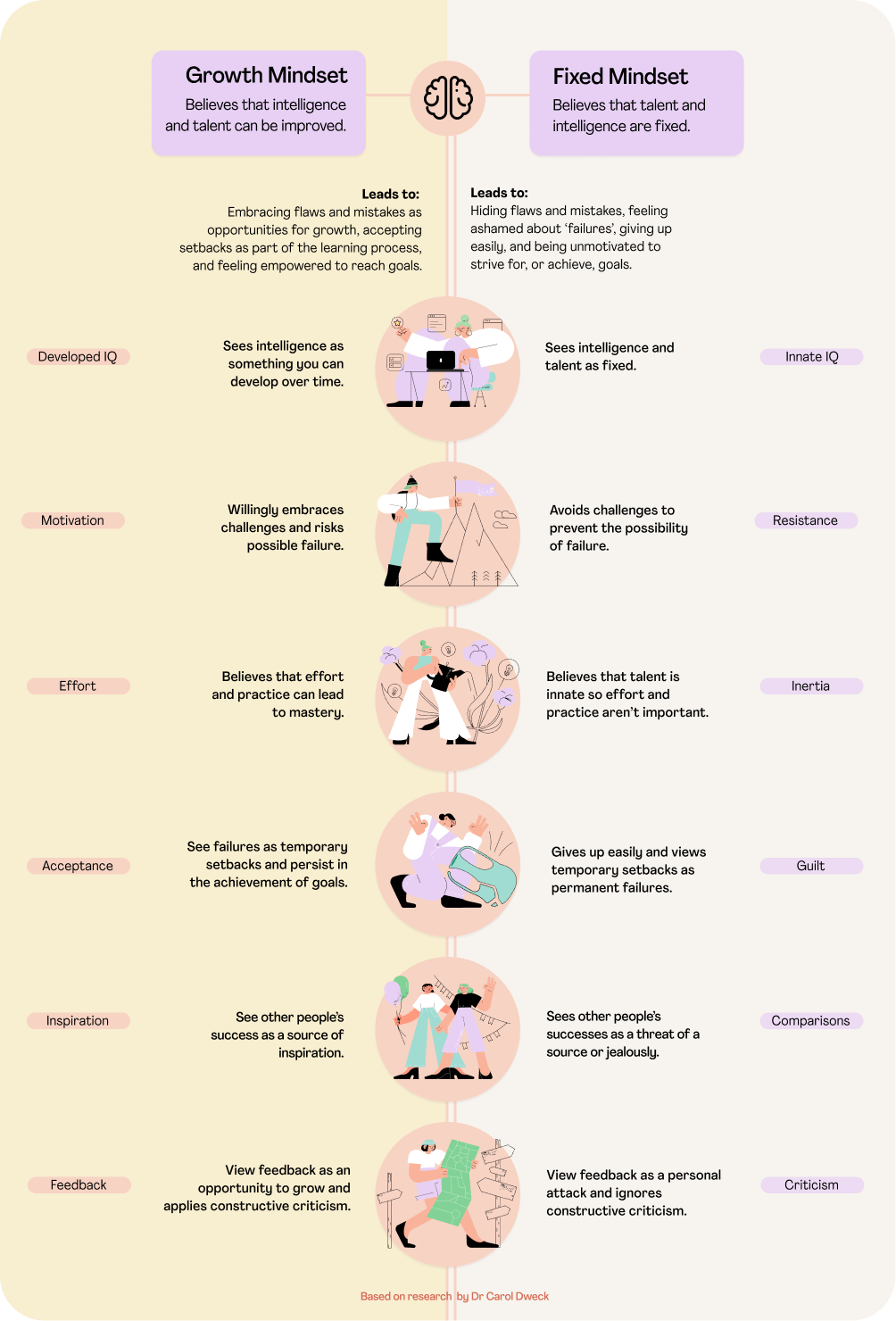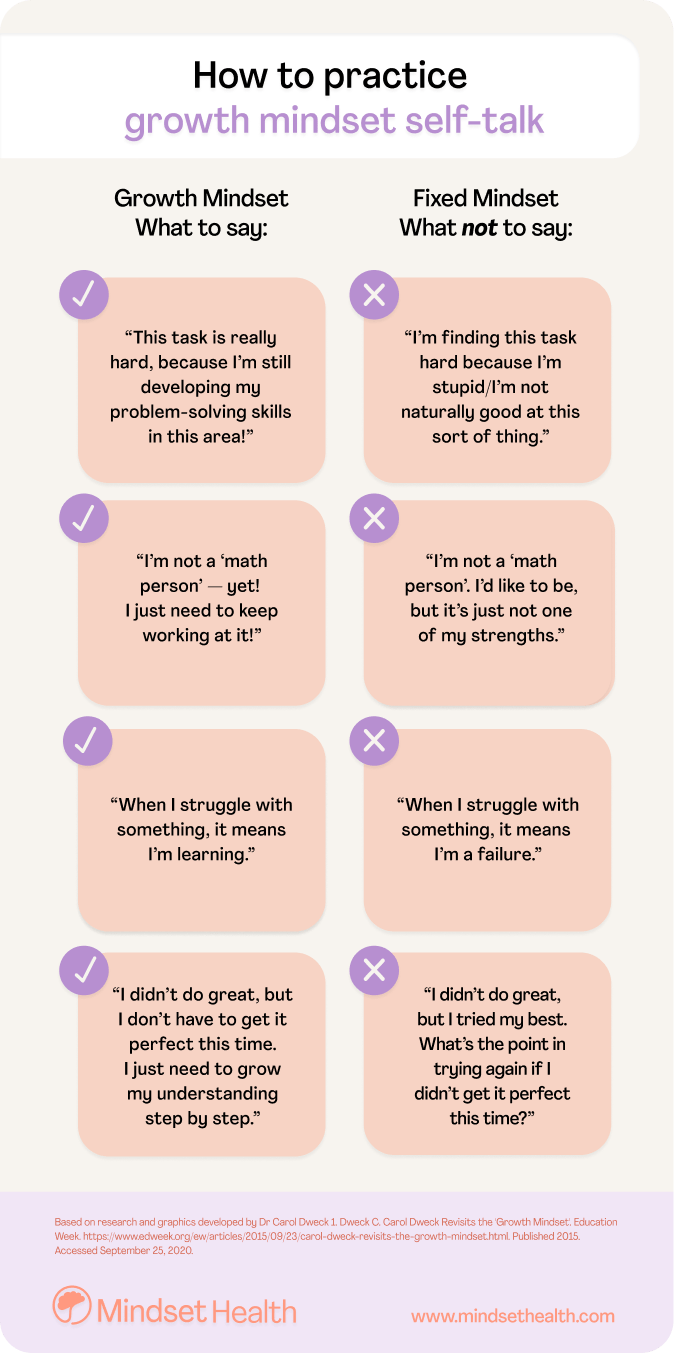Neuroplasticity and the Growth Mindset
04 May 2022 / CULTURAL
Neuroplasticity
People's view about our brain has changed over the years. We used to think the brain was formed almost completely before birth and it will pretty much stay the same through our whole life. Now new researches have suggested that our brain can actually change a lot to adapt to any new learning or experiences we have had in our lives. This is called Neuroplasticity.
The brain neuroplasticity has many benefits. In allowing your brain to adapt and change, this helps promote:
- The ability to learn new things
- The ability to enhance cognitive capabilities
- Enhanced memory abilities
- Recovery from strokes and traumatic brain injuries
- Strengthening areas if some functions are lost or decline
Based on this research, it seems like the intention for life-long learning could be more than a good will or a dream. It is more realistic then we thought. When we learn, we form new pathways in the brain. Each new lesson has the potential to connect new neurons and change our brain’s default mode of operation. Of course, not all learning is created equal—learning new facts does not necessarily take advantage of the amazing neuroplasticity of the brain, but learning a new language or a musical instrument certainly does. It is through this sort of learning that we may be able to figure out how to purposefully rewire the brain. The extent to which we apply the brain’s near-magical abilities is also dependent on how invested we are in promoting neuroplasticity and how we approach life in general.
So what are some of the ways that we can increase our neuroplasticity?
-
Intermittent fasting increases synaptic adaptation, promotes neuron growth, improve overall cognitive function, and decreases the risk of neurodegenerative disease;
- Traveling exposes your brain to novel stimuli and new environments, opening up new pathways and activity in the brain;
- Using mnemonic devices: memory training can enhance connectivity in the prefrontal parietal network and prevent some age-related memory loss;
- Learning a musical instrument may increase connectivity between brain regions and help form new neural networks;
- Non-dominant hand exercises can form new neural pathways and strengthen the connectivity between neurons;
- Reading fiction increases and enhances connectivity in the brain;
- Expanding your vocabulary activates the visual and auditory processes as well as memory processing;
- Creating artwork enhances the connectivity of the brain at rest (the “default mode network” or DMN), which can boost introspection, memory, empathy, attention, and focus;
- Dancing reduces the risk of Alzheimer’s and increases neural connectivity;
- Sleeping encourages learning retention through the growth of the dendritic spines that act as connections between neurons and help transfer information across cells (Nguyen, 2016);
- Physical exercise good physical fitness can prevent or slow the normal age-related neuronal death and damage to the hippocampus, and even increase the volume of the hippocampus (Niemann et al., 2014);
The Growth Mindset
People who believe their talents can be developed (through hard work, good strategies, persistence and input from others) have a growth mindset. They tend to achieve more than those with a more fixed mindset (who think if you’re not good at something now, you’ll never be good at it).

A growth mindset worries less about looking smart and put more energy into learning. They also recognize that setbacks are a necessary part of the learning process and allow themselves to ‘bounce back’ by increasing motivational effort. Therefore, a growth mindset is crucial for learning, resilience, motivation, and performance.
Below are some typical examples of what the two different mindset might think:
Fixed Mindset
- When I think I’m likely to fail I avoid the challenge.
- When someone does better than me at something I’m good at, I feel unsure about my abilities.
- My basic level of intelligence is fixed and no amount of effort will change that.
- When I’m given some feedback I can feel defensive.
- Although I can learn new things, if I’m not naturally talented I’ll never be really good at them.
- People who are really good at maths are born with that ability.
Growth Mindset
- I know that when I fail, it’s just an opportunity to learn from my mistakes so I can improve my performance.
- If I put the effort in and keep trying, I believe I can substantially increase my intelligence.
- When I’m given some feedback I use it to improve my performance.
- When someone is more skilled at something than me, I learn everything I can from them to increase my own performance.
- I don’t feel stupid if I don’t get something immediately. I know I’ll improve with effort.
- I can improve all areas of my life by developing my strengths and abilities.
- I celebrate my successes and recognise all of the effort and perseverance that helps me to achieve my goals.
- When I approach a new challenge, I remember other times that my hard work resulted in success.
If you think: Oops, some of these fixed-mindset statements sound like me. Don't worry! According to Dr Carol Dweck, everyone is actually a mixture of fixed and growth mindsets, and that mixture continually evolves with experience. So with the growth-mindset in mind, we know we can always evolve into it.
It’s not easy to attain a growth mindset. One reason is that we all have our own fixed-mindset triggers. When we face challenges, receive criticism, or fare poorly compared with others, we can easily fall into insecurity or defensiveness, a response that inhibits growth. There is also a misconception that we could confuse a growth mindset with being flexible or open-minded or with having a positive outlook — qualities we might think we already have. Dr Carol calls this a false growth mindset. Therefore, it is important that we are able to identify and work with the triggers. We will benefit from learning to recognize when our fixed-mindset “persona” shows up and what it says to make us feel threatened or defensive. Over time we will learn to talk back to it, persuading it to collaborate with us as we pursue challenging goals.
This learning journey with devAcademy has been a great chance for me to learn and develop growth mindset. Below are some ways how I intend to cultivate my growth mindset:
- Remember that, scientifically, you will improve. Come back to this blog if you forget.
- Practice growth mindset self-talk.

- Get out of your comfort zone. Embrace challenges. Try to choose the option that allows you to grow.
- Reward the process and the effort exerted.
- Reach out to others. Get feedback about what you did well and where you can improve.
- Treat confusion and setbacks as part of the learning process and learning opportunities.
- Keep learning!
References
Ackerman, C. E., MA. (2022, March 28). What is Neuroplasticity? A Psychologist Explains [+14 Exercises]. PositivePsychology. https://positivepsychology.com/neuroplasticity/
Balfour, S. (2021, September 16). Reflecting on a growth mindset for learning success. Upskills. https://upskills.co.nz/growth-mindset-learning-success/?GA&gclid=Cj0KCQjwpcOTBhCZARIsAEAYLuVzDcAeTIliBkSSu7a1_ZjZ638IerpTilbhgIOa7dH0Pb4bpXANVP0aAvLHEALw_wcB
Dweck, C. (2016, January 13). What Having a “Growth Mindset” Actually Means. Harvard Business Review. https://hbr.org/2016/01/what-having-a-growth-mindset-actually-means
Smith, J. (2020, September 25). Growth Mindset vs Fixed Mindset: How what you think affects what you achieve. Mindsethealth. https://www.mindsethealth.com/matter/growth-vs-fixed-mindset#:%7E:text=A%20growth%20mindset%20simply%20means,back’%20by%20increasing%20motivational%20effort.
Go Home >